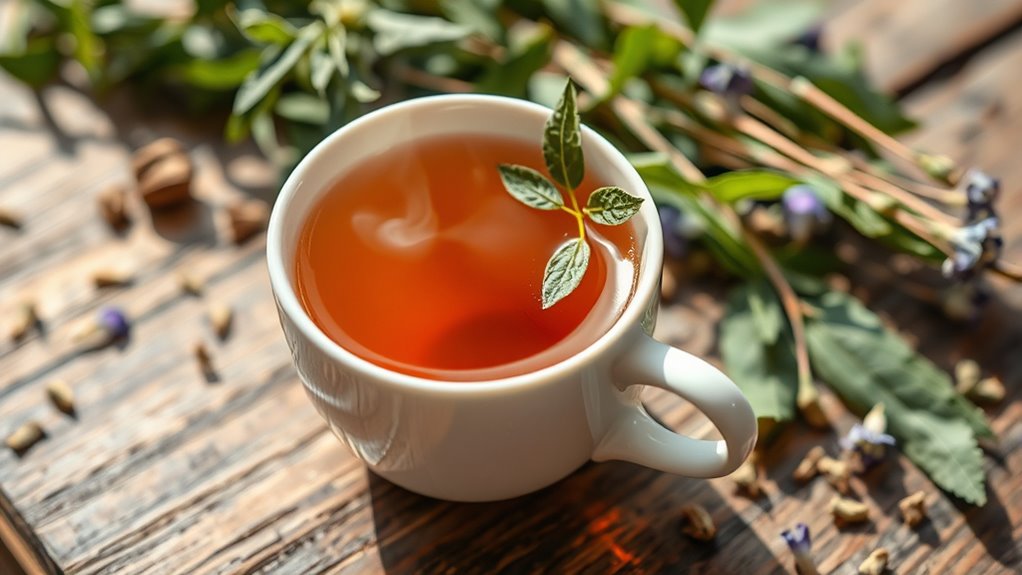Drinking brewed tea regularly can positively influence your gut microbiome by providing bioactive compounds like polyphenols that feed beneficial bacteria such as Bifidobacteria and Lactobacilli. Proper brewing extracts these compounds, supporting microbial diversity and gut health. Hotter brews may enhance benefits, but even milder teas offer advantages. The way you prepare and enjoy your tea matters—stick around to discover how specific brewing tips can maximize these gut benefits.
Key Takeaways
- Tea polyphenols serve as food for beneficial gut bacteria, promoting microbial diversity.
- Proper brewing extracts more bioactive compounds, enhancing tea’s positive effects on the microbiome.
- Regular tea consumption supports a resilient and diverse gut microbial ecosystem.
- Different tea types release varying compounds that influence gut microbiome interactions.
- Mindful brewing practices optimize the bioavailability of compounds that support gut health.

Have you ever wondered how your daily cup of tea might influence your gut health? The way you brew your tea can play a surprisingly important role in how it interacts with your gut microbiome. When you choose your tea and prepare it thoughtfully, you’re engaging in more than just a calming ritual—you’re potentially affecting microbiome modulation. Different tea types, brewing times, and temperatures can alter the compounds released into your cup, impacting how these bioactive substances reach your digestive system. Proper tea brewing ensures you extract the maximum benefits from tea polyphenols and other compounds, which are believed to support a healthy and diverse microbiome.
As you sip on your tea, the polyphenols—especially catechins in green tea or theaflavins in black tea—begin to interact with your gut bacteria. These compounds aren’t fully absorbed in the small intestine; instead, they travel to your colon, where they serve as food for beneficial microbes. This process is a form of microbiome modulation, where tea compounds encourage the growth of health-promoting bacteria like Bifidobacteria and Lactobacilli. The more diverse and balanced your microbiome, the better your digestion, immune response, and overall health. Drinking tea regularly, with mindful brewing, can subtly influence this microbial landscape, promoting a more resilient and varied gut ecosystem.
Additionally, research indicates that certain brewing methods can influence the bioavailability of polyphenols, affecting how effectively they support microbiome health.
The temperature at which you brew your tea also matters. Hotter brews tend to extract more polyphenols, which can enhance microbiome modulation, but overly hot tea might irritate your stomach or diminish delicate compounds. Conversely, cooler brewing temperatures might produce milder flavors but still deliver beneficial bioactives. The duration of brewing is equally important. Steeping your tea for the right amount of time ensures maximum extraction—too short, and you miss out on potent compounds; too long, and you risk bitterness or over-extraction, which may reduce some health benefits. Experimenting with your tea brewing process can help you find the perfect balance to maximize gut health benefits.
Ultimately, your approach to tea brewing influences its composition and, consequently, its ability to support a diverse microbiome. Regularly enjoying well-brewed tea, combined with a balanced diet, can enhance microbiome modulation and promote gut health. It’s a simple yet effective way to make your daily routine work in favor of your digestive system’s health. So next time you prepare your tea, think about the brewing process as a tool to boost your microbiome diversity and overall well-being.
Frequently Asked Questions
Does Tea Consumption Affect Gut Bacteria in Children Differently?
You might wonder if tea affects children’s gut bacteria differently. Tea can influence child digestive health by supporting early microbiome development through antioxidants and polyphenols. Since children’s microbiomes are still forming, tea consumption could have a unique impact compared to adults. Drinking tea in moderation may promote beneficial bacteria, but it’s crucial to take into account individual health needs. Always consult a healthcare professional for personalized advice on tea’s role in gut health.
Are There Specific Types of Tea More Beneficial for Gut Health?
You might wonder if certain tea varieties are more beneficial for gut health. Generally, teas with higher polyphenol content, like green and black teas, offer more benefits. These compounds support a diverse gut microbiome by promoting good bacteria growth. Choosing teas rich in polyphenols can help improve your gut health, so opt for varieties like green, black, or oolong to maximize these benefits.
How Much Tea Should I Drink Daily for Gut Benefits?
Imagine a warm cup of tea gently soaking into your day like sunlight on leaves. For gut benefits, aim for about 3 to 4 cups of tea daily. This tea intake provides antioxidants and polyphenols that support your microbiome without overdoing it. Consistent daily consumption helps you enjoy the full benefits, but remember to balance it with hydration and a healthy diet for ideal gut health.
Can Tea Help Restore Gut Microbiome After Antibiotics?
Tea antioxidants may help restore your gut flora after antibiotics by reducing inflammation and supporting beneficial bacteria growth. Drinking tea regularly introduces these antioxidants, which can aid in rebalance your microbiome. While tea alone isn’t a cure, incorporating it into your routine could promote healthier gut bacteria. Remember, combining tea with a balanced diet and probiotics will give your gut the best chance to recover and thrive after antibiotic use.
Does Tea Influence Gut Microbiome Diversity in People With Digestive Disorders?
Coincidentally, you might find that herbal teas and fermented varieties can influence your gut microbiome, especially if you have digestive disorders. Drinking these teas introduces beneficial compounds that promote diversity and balance in your gut bacteria. While research is still emerging, incorporating herbal teas like chamomile or fermented drinks like kefir tea could support your digestive health and potentially improve microbiome diversity over time.
Conclusion
So, as you sip your tea, imagine you’re a modern-day Hippocrates, nurturing your gut like a medieval herbalist. Drinking tea can indeed boost your microbiome diversity, helping your gut flourish like a lush, secret garden. It’s not just about the drink itself, but about embracing habits that support your health. So go ahead—brew a cup, and let your gut’s vibrant ecosystem thrive, turning your wellness journey into a timeless ritual of self-care.










